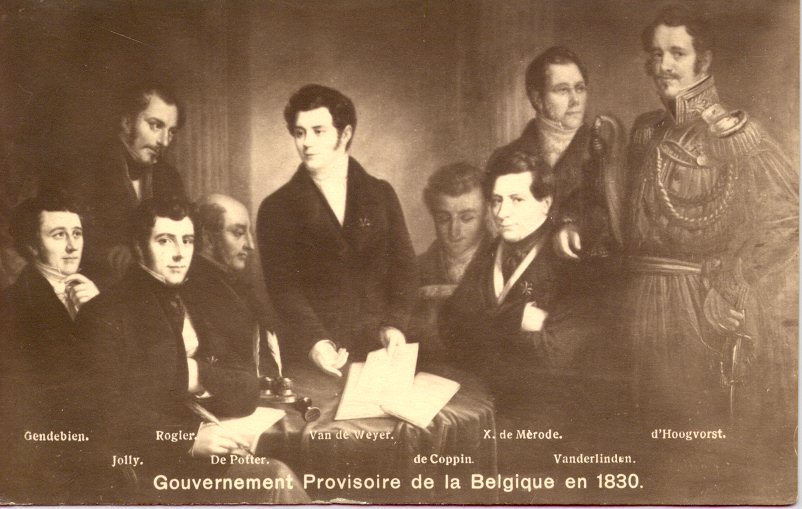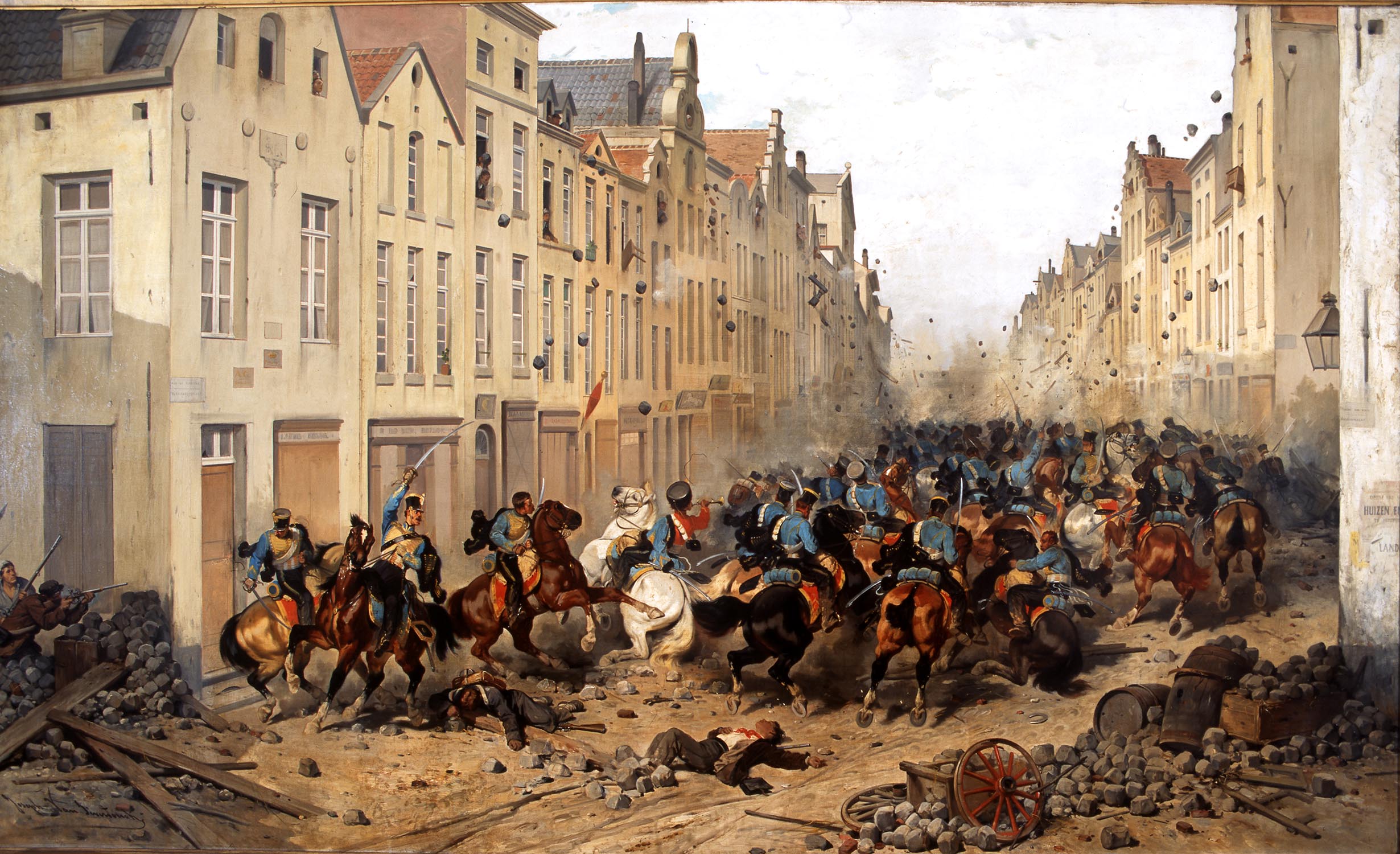|
Belgian People
Belgians ( ; ; ) are people identified with the Kingdom of Belgium, a federal state in Western Europe. As Belgium is a multinational state, this connection may be residential, legal, historical, or cultural rather than ethnic. The majority of Belgians, however, belong to two distinct linguistic groups or ''communities'' (; ) native to the country, i.e. its historical regions: Flemings in Flanders, who speak Dutch, West Flemish and Limburgish; and Walloons in Wallonia, who speak French or Walloon. There is also a substantial Belgian diaspora, which has settled primarily in the United States, Canada, France, and the Netherlands. Etymology The 1830 revolution led to the establishment of an independent country under a provisional government and a national congress. The name "Belgium" was adopted for the country, the word being derived from ''Gallia Belgica'', a Roman province in the northernmost part of Gaul that, before Roman invasion in 100 BC, was inhabited by ... [...More Info...] [...Related Items...] OR: [Wikipedia] [Google] [Baidu] |
Belgae
The Belgae ( , ) were a large confederation of tribes living in northern Gaul, between the English Channel, the west bank of the Rhine, and the northern bank of the river Seine, from at least the third century BC. They were discussed in depth by Julius Caesar in his Commentarii de Bello Gallico, account of his wars in Gaul. Some peoples in southern Roman Britain, Britain were also called Belgae and had apparently moved from the continent. T. F. O'Rahilly believed that some had moved further west and he equated them with the Fir Bolg in Ireland. The Roman province of Gallia Belgica was named after the continental Belgae. The term continued to be used in the region until the present day and is reflected in the name of the modern country of Belgium. Etymology The consensus among linguists is that the ethnic name ''Belgae'' probably comes from the Proto-Celtic root ''*belg-'' or ''*bolg-'' meaning "to swell (particularly with anger/battle fury/etc.)", cognate with the Dutch language ... [...More Info...] [...Related Items...] OR: [Wikipedia] [Google] [Baidu] |
Flanders
Flanders ( or ; ) is the Dutch language, Dutch-speaking northern portion of Belgium and one of the communities, regions and language areas of Belgium. However, there are several overlapping definitions, including ones related to culture, language, politics, and history, and sometimes involving neighbouring countries. The demonym associated with Flanders is Flemings, Fleming, while the corresponding adjective is Flemish people, Flemish, which can also refer to the collective of Dutch dialects spoken in that area, or more generally the Belgian variant of Standard Dutch. Most Flemings live within the Flemish Region, which is a federal state within Belgium with its own elected government. However, like Belgium itself, the official capital of Flanders is the City of Brussels, which lies within the Brussels, Brussels-Capital Region, not the Flemish Region, and the majority of residents there are French speaking. The powers of the Flemish Government in Brussels are limited mainly ... [...More Info...] [...Related Items...] OR: [Wikipedia] [Google] [Baidu] |
Martinus Nijhoff Publishers
Brill Academic Publishers () is a Dutch international academic publisher of books, academic journals, and databases founded in 1683, making it one of the oldest publishing houses in the Netherlands. Founded in the South Holland city of Leiden, it maintains its headquarters there, while also operating offices in Boston, Paderborn, Vienna, Singapore, and Beijing. Since 1896, Brill has been a public limited company (). Brill is especially known for its work in subject areas such as Oriental studies, classics, religious studies, Jewish studies, Islamic studies, Asian studies, international law, and human rights. The publisher offers traditional print books, academic journals, primary source materials online, and publications on microform. In recent decades, Brill has expanded to digital publishing with ebooks and online resources including databases and specialty collections varying by discipline. History Founding by Luchtmans, 1683–1848 On 17 May 1683, the Leiden booksel ... [...More Info...] [...Related Items...] OR: [Wikipedia] [Google] [Baidu] |
Oxford University Press
Oxford University Press (OUP) is the publishing house of the University of Oxford. It is the largest university press in the world. Its first book was printed in Oxford in 1478, with the Press officially granted the legal right to print books by decree in 1586. It is the second-oldest university press after Cambridge University Press, which was founded in 1534. It is a department of the University of Oxford. It is governed by a group of 15 academics, the Delegates of the Press, appointed by the Vice Chancellor, vice-chancellor of the University of Oxford. The Delegates of the Press are led by the Secretary to the Delegates, who serves as OUP's chief executive and as its major representative on other university bodies. Oxford University Press has had a similar governance structure since the 17th century. The press is located on Walton Street, Oxford, Walton Street, Oxford, opposite Somerville College, Oxford, Somerville College, in the inner suburb of Jericho, Oxford, Jericho. ... [...More Info...] [...Related Items...] OR: [Wikipedia] [Google] [Baidu] |
National Congress Of Belgium
The National Congress (, ) was a temporary legislature, legislative assembly in Belgium, convened in 1830 in the aftermath of the Belgian Revolution. Its purpose was to devise a Constitution of Belgium, national constitution for the new state, whose independence had been proclaimed on 4 October 1830 by the self-declared Provisional Government of Belgium, Provisional Government. History The National Congress was 1830 Belgian general election, elected by approximately 30,000 voters on 3 November 1830 and consisted of 200 members. Its president was Baron Erasme Louis Surlet de Chokier. The assembly chose a constitutional monarchy, constitutional popular monarchy as the form of government for Belgium and chose the son of the July Monarchy, French King Louis-Philippe, Prince Louis, Duke of Nemours, Louis, Duke of Nemours, as the new head of state. Other candidates included Auguste de Beauharnais, 2nd Duke of Leuchtenberg, Auguste de Beauharnais and Archduke Charles, Duke of Teschen, ... [...More Info...] [...Related Items...] OR: [Wikipedia] [Google] [Baidu] |
Provisional Government Of Belgium
The Provisional Government (; ) was the first iteration of the Belgian state, formed in the midst of the Belgian Revolution. After Dutch forces were expelled from Brussels on 27 September 1830, the recently created Revolutionary Committee transformed into the Provisional Government. The independence of Belgium as a state was officially declared on 4 October. On 7 February 1831, the Constitution of Belgium was proclaimed and Erasme Louis Surlet de Chokier was declared regent. With Belgium now under a constitutional monarchy, the Provisional Government was dissolved. History As the Belgian Revolution raged in Brussels, William I of the Netherlands attempted to forcefully end the revolt. An army under William's son, Prince Frederick, occupied the city on 23 September. A Revolutionary Committee was formed by the Belgians to organize a revolt against the occupying force, and the Dutch began their retreat on the 26th. On 27 September the Revolutionary Committee assumed the titl ... [...More Info...] [...Related Items...] OR: [Wikipedia] [Google] [Baidu] |
Belgian Revolution
The Belgian Revolution (, ) was a conflict which led to the secession of the southern provinces (mainly the former Southern Netherlands) from the United Kingdom of the Netherlands and the establishment of an independent Kingdom of Belgium. The people of the south were mainly Flemish people, Flemings and Walloons. Both peoples were traditionally Roman Catholic as contrasted with Protestant-dominated (Dutch Reformed) people of the north. Many outspoken liberals regarded William I of the Netherlands, King William I's rule as despotic. There were high levels of unemployment and industrial unrest among the working classes. On 25 August 1830, riots erupted in Brussels and shops were looted. Theatergoers who had just watched the nationalistic opera ''La muette de Portici'' joined the mob. Uprisings followed elsewhere in the country. Factories were occupied and machinery destroyed. Order was restored briefly after William committed troops to the Southern Provinces but rioting continued ... [...More Info...] [...Related Items...] OR: [Wikipedia] [Google] [Baidu] |
Walloon Language
Walloon (; natively ; ) is a Romance language that is spoken in much of Wallonia and, to a very small extent, in Brussels, Belgium; some villages near Givet, northern France; and a clutch of communities in northeastern Wisconsin, United States.Université du Wisconsin : collection de documents sur l'immigration wallonne au Wisconsin, enregistrements de témoignages oraux en anglais et wallon, 1976University of Wisconsin Digital Collection : Belgian-American Research Collection /ref> It belongs to the ''langues d'oïl'' dialect continuum, the most prominent member of which is French. The historical background of its formation was the territorial extension since 980 of the Principality of Liège to the south and west. Walloon is classified as "definitely endangered" by the UNESCO ''Atlas of the World's Languages in Danger''. Despite its rich literature, beginning anonymously in the 16th century and with well-known authors since 1756, the use of Walloon has decreased markedly ... [...More Info...] [...Related Items...] OR: [Wikipedia] [Google] [Baidu] |
French Language
French ( or ) is a Romance languages, Romance language of the Indo-European languages, Indo-European family. Like all other Romance languages, it descended from the Vulgar Latin of the Roman Empire. French evolved from Northern Old Gallo-Romance, a descendant of the Latin spoken in Northern Gaul. Its closest relatives are the other langues d'oïl—languages historically spoken in northern France and in southern Belgium, which French (Francien language, Francien) largely supplanted. It was also substratum (linguistics), influenced by native Celtic languages of Northern Roman Gaul and by the Germanic languages, Germanic Frankish language of the post-Roman Franks, Frankish invaders. As a result of French and Belgian colonialism from the 16th century onward, it was introduced to new territories in the Americas, Africa, and Asia, and numerous French-based creole languages, most notably Haitian Creole, were established. A French-speaking person or nation may be referred to as Fra ... [...More Info...] [...Related Items...] OR: [Wikipedia] [Google] [Baidu] |
Wallonia
Wallonia ( ; ; or ), officially the Walloon Region ( ; ), is one of the three communities, regions and language areas of Belgium, regions of Belgium—along with Flemish Region, Flanders and Brussels. Covering the southern portion of the country, Wallonia is primarily Geographical distribution of French speakers, French-speaking. It accounts for 55% of Belgium's territory, but only a third of its population. The Walloon Region and the French Community of Belgium, which is the political entity responsible for matters related mainly to culture and education, are independent concepts, because the French Community of Belgium encompasses both Wallonia and the bilingual Brussels-Capital Region but not the German-speaking Community of Belgium, which administers nine municipalities in Eastern Wallonia. During the Industrial Revolution, Wallonia was second only to the United Kingdom in industrialization, capitalizing on its extensive deposits of coal and iron. This brought the regio ... [...More Info...] [...Related Items...] OR: [Wikipedia] [Google] [Baidu] |
Walloons
Walloons ( ; ; ) are a Gallo-Romance languages, Gallo-Romance ethnic group native to Wallonia and the immediate adjacent regions of Flanders, France, Germany, Luxembourg and the Netherlands. Walloons primarily speak ''langues d'oïl'' such as Belgian French, Picard language, Picard and Walloon language, Walloon. Walloons are primarily Catholic Church, Roman Catholic, with a historical minority of Protestantism which dates back to the Reformation era. In modern Belgium, Walloons are, by law, termed a "distinctive linguistic and ethnic community" within the country, as are the neighbouring Flemish people, Flemish, a Germanic peoples, Dutch (Germanic) speaking community. When understood as a regional identification, the ethnonym is also extended to refer to the inhabitants of the Walloon region in general, regardless of ethnicity or ancestry. Etymology The term ''Walloon'' is derived from ''*walha'', a Proto-Germanic term used to refer to Celtic languages, Celtic and Latin speake ... [...More Info...] [...Related Items...] OR: [Wikipedia] [Google] [Baidu] |





